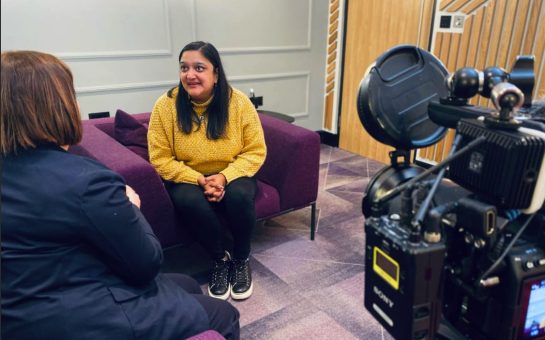Content Warning: This article discusses self harm and suicide.
“I feel like I just cannot catch a break. It’s just one thing after another: I’m broken down, crying, going into a depressive state,” Natalie explained.
The 37-year-old from south London suffers from endometriosis, a condition which affects around 1.5 million women in the UK.
It currently takes an average of eight years to get a diagnosis, and delays caused by the pandemic have done little to help speed this up.
Instead, women have been left waiting months for treatment, and since last summer, Natalie has had three appointments cancelled.
Her first was cancelled after she was told they were no longer taking any new referrals, and she then had to wait four months to submit a new referral.
“Fertility can be affected and I’m wanting to get pregnant, I’m getting old,” Natalie said.
“One doctor has said to me don’t get pregnant until my hernia is fixed and now recently my GP has said to me ‘just do it, just get pregnant’. I’m just thinking, what do I do?”
Natalie has an umbilical hernia from past endometriosis surgery which needs treating, as well as experiencing new and returning endometriosis symptoms.
These have prompted concerns about her ability to have children.
“You just want to make sure that everything is okay before trying to get pregnant because the fear is miscarriage,” she explained.
“I just want to be normal, whatever normal is. I just want this to go.”
Natalie is not alone in her experiences.
Women all over the country are experiencing severe impacts on their daily lives as a result of delays to endometriosis treatment caused by the pandemic.
Endometriosis is a condition where tissue similar to the lining of the womb starts to grow in other places, such as the ovaries and fallopian tubes.
For singer Emma Panas, this delay was too long and she was tragically found dead after two of her specialist endometriosis appointments were cancelled due to the pandemic.
Last week a coroner ruled that she died from Sudden Adult Death Syndrome, with concerns raised about the high level of painkillers in her system.
Her brother, Sebastian, told the inquest that her death was a failing of the NHS, saying that reduced care had meant she needed to self-medicate to the point where she could live.
A unhealthy relationship with pain medication is something which Sophie* also experienced.
“I have a history of drug addiction and substance abuse, so I try to stay away from medication as much as I can. But I could not function without taking an unhealthy amount of painkillers to get through the day, which was incredibly dangerous for me,” she said.
The 21-year-old from Essex also explained how NHS delays had left her seeking treatment privately, after her mental health had suffered due to her endometriosis.
“There were times that I relapsed into self-harm, and even times I tried to end my own life because I couldn’t see the end to the pain,” she said.
“I felt like I was going crazy. I thought I was going to have to deal with the pain until menopause which was a horrible thought.
“I decided to try private because I didn’t feel like my concerns were being taken seriously by the NHS.”
A recent study by Endometriosis UK and Oxford University found that 47% of those surveyed stated that their mental health had worsened since the pandemic began.
During the first lockdown, Sophie started a new job which gave her private medical care.
Through this, she was able to see a gynaecologist, who conducted various tests before operating only two months later to investigate and excise endometriosis.
“It was difficult emotionally for me as it was my first surgery and due to COVID I had to wake up alone, but I was able to go home the same day,” Sophie said.
“My periods are still painful but knowing that it’s an actual medical condition and that I wasn’t just over-exaggerating it really validated my feelings.”
Nicole, from Yorkshire, is currently waiting for surgery after she was told in December that this was the best way forward.
She says she is continually returning to her doctors due to her increased pain levels.
“As my symptoms worsen I am struggling to see a light at the end of the tunnel,” she said.
“Each pain day I feel like I’d rather be dead than experience this pain anymore. Endometriosis affects every aspect of my life and whilst waiting for surgery there’s nothing else I can do.
“I understand there are more important issues right now, but I am in pain every single day and not having a clue when surgery could be has been difficult. I’m exhausted and just feel defeated.”
Faye Farthing, Communications Manager at Endometriosis UK, told SWL of the unexpected challenges to their treatment those with the condition have experienced as a result of COVID.
She said: “We are hearing lots of stories around not being able to obtain medications, or being asked to change to different drugs which might not have the same effects, which can be upsetting and unsettling.”
Farthing also called for the end of the current postcode lottery to accessing healthcare practitioners who specialize in endometriosis, and said that now was the opportunity for a reassessment of the current delivery of endometriosis treatment.
She added: “It’s important that those with endometriosis are not left in the dark about when they can expect their care to resume, and that integrated pathways are adopted to support a person’s physical and mental health.
“Implementing effective processes within the NHS will help healthcare practitioners support diagnosis and get those with endometriosis symptoms to the right place, in hospitals with the right expertise, at the right time.”
*Some names have been changed for anonymity.
Featured image credit: Shora Shimazaki




